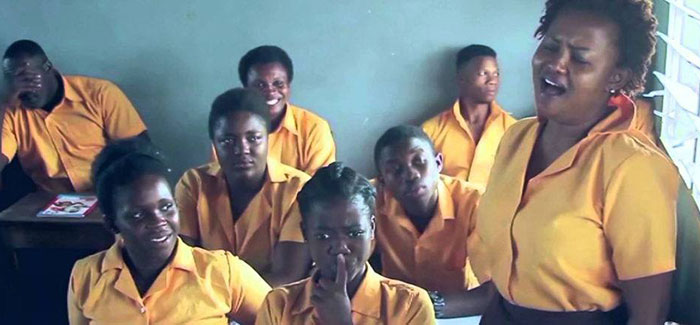Business & Finance

- Super User
- Category: Business & Finance
- Thursday, 02 March 2017 16:31
121. The Central Railway Line will cover a distance of 200km and spans from Kotoku on the Eastern Line to Huni Valley on the Western Line. It will have a branch line from Achiase to Kade and we plan to undertake feasibility study on the line and extend it to Kibi.
HOUSING
122. Mr. Speaker, government recognizes that the dream of all Ghanaians, is to own a home or at least to have decent rental accommodation. There are, however, major constraints to this dream. These include:
♦ The high cost of buying and renting a home;
♦ Undersupply of annual requirements of housing units;
♦ Lack of long term financing for real estate development; and
♦ Lack of appropriate financing arrangement.
123. To reduce the housing deficit, government will use appropriate mix of public policy and public private investment to deliver quality, affordable, housing solutions that meets the needs and financial capacity of ordinary Ghanaians.
Water and Sanitation
124. Mr. Speaker, major water project to be undertaken in 2017 would include, the continuation of the Greater Accra Metropolitan Area (GAMA) water extension projects as well as those of Kumasi and Cape Coast. The Kpong, Akim Oda and Ho water expansion projects, Tono Water Treatment project for the Upper East Region in Navrongo, as well as those of the Yendi and Damongo will be undertaken whilst the Wa project will be completed. Preparatory works for the Sunyani and Techiman as well as the Sekondi-Takoradi water supply projects will be finalized.
125. In addition, Mr. Speaker, will complete the ongoing 1,000 boreholes projects and also initiate the construction of at least 2,000 boreholes across the country as part of the drive to get us closer to the desired goal of „Water for All‟.
126. In 20I7, the Ministry will pursue a Comprehensive Sludge Management Programme (CoSMaP) targeted at constructing 2No. Faecal Sludge Treatment Plants in Sekondi-Takoradi and Tamale Metropolitan Areas with the objective of stemming the disposal of faecal matter into water bodies and drains. The Ministry will also provide appropriate uniform and identification for 4,500 Environmental Health Officers nationwide to ensure visibility and enforcement of environmental sanitation and basic hygiene bye-laws.
Roads and Highways
127. The Ministry maintained its focus on routine and periodic maintenance activities to protect the huge investment made by Government in the provision of the road infrastructure. In 2016, routine maintenance activities were undertaken on 10,723.49km (90 percent of the approved work plan) of the trunk road network; 16,183km (72 percent of the approved work plan) on the feeder road network; and 9,384km (94 percent of the approved work plan) on the urban road network.
128. Mr Speaker, inspite of the major investments made in the road sector, we continue to have major challenges. The past few years has recorded a significant increase in the award of contracts, leading to a large portfoli of projects that are in excess of what our budget can accommodate. This has led to delayed payments and the resultant penalty payments, accumulation of arrears and unacceptable poor quality but costly road construction.
129. There are also the issues of limited contractor capacities leading to substandard work, encroachment of right of way and lack of maintenance and care. In 2017 government will undertake a review to of existing projects to bring them to more sustainable levels and within available funding. Monitoring will be strenghtened and efficiency measures followed. New peojects will only be accomodated after this review and within the allowable fiscal space
130. In the meantime maintenance work will be continued. These will include 11,900km, 22,950km and 10,200km of routine maintenance activities (grading, pothole patching, shoulder maintenance, vegetation control) on trunk, feeder and urban road networks respectively.
131. The Ministry will also undertake minor rehabilitation works on 60km of trunk roads, 350km of feeder roads and 100km of urban roads.
132. In 2017, 195km of trunk roads and 25km of urban roads will be constructed. Some of the key roads programmed for construction include;
♦ Construction of Bridge on the Volta River at Volivo
♦ Nsawam - Apedwa Road(Kwafokrom – Apedwa Road)
♦ Tamale – Yendi Road
♦ Bolgatanga – Bawku - Polmakom
♦ Nkwanta - Oti Damanko Road
♦ Oti Damanko - Nakpanduri Road
♦ Berekum – Seikwa Road
♦ Enchi - Dadieso Road
♦ Kasoa Interchange and Ancillary Works
♦ Dualisation of Ho Main Roads
♦ Construction of Ho Bypass
♦ Construction of Obetsebi Lamptey Interchange
♦ Construction of Pokuase Interchange
♦ Kumasi Roads and Drainage Extension Project
EDUCATION
133. The mandate of the Ministry is to provide equitable access and quality education to all Ghanaians to make them functional citizens in order to contribute to the growth and development of the country.
134. Over the medium term, Government aims is to shift the structure and content of Ghana‟s education system away from merely passing examinations to building character, nurturing values and raising literate, confident and engaged citizens who can think critically.
135. To overcome this challenge, Government will also redefine basic education to include secondary education, covering technical, vocational and agricultural education.
136. As part of this initiative, Basic Education Certificate Examinations (BECE) will be used as a tool for placement of students into second cycle schools and not for certification.
]137. To improve the quality and relevance of education, and further make the products of our school system competitive, Government will review the Basic level curriculum to focus on the four R‟s (Reading, wRiting, aRithmetic and Recreation to include life skills and creative skills). Government intends to ensure that all our children have these basic skills when they exit the Primary School system.
HEALTH
138. The health sector continues to grapple with the challenge of bridging the equity gap in access to healthcare between urban and rural as well as the rich and poor, production and distribution of health personnel, high under five and maternal mortality rates and neglect of the mental health subsector resulting in huge unmet need for mental health services.
139. In 2017 there will be improved coverage of antenatal care services and delivery by skilled attendants is expected to increase from the 2016 targets of 78 percent and 53 percent to 80 percent and 55 percent, respectively. The target for fully immunized children will be maintained at above 90 percent in 2017.
GENDER AND SOCIAL PROTECTION
140. Gender and Social Protection Mr. Speaker, following the conclusion of the Millennium Development Goals (MDGs) in 2015, Ghana joined the world in developing the Sustainable Development Goals (SDGs) which was endorsed by the United Nations at its 70th session in September, 2015. The SDGs is adopted globally to end poverty, protect the planet and ensure prosperity for all. In order to fight extreme poverty and vulnerabilities and ensure that no group is disadvantaged and left behind in the development process, government is committed to improve on social protection policy implementation and systems.
The Ministry of Gender, Children and Social Protection will facilitate the passage of the Affirmative Action Bill and the Domestic Workers Bills. We will refocus the LEAP programme and adopt effective means of targeting and enrolling beneficiary households. The School Feeding Programme will also be reviewed to make it more transparent and effective and linked to the agriculture sector initiatives.
YOUTH AND SPORTS DEVELOPMENT
141. Mr. Speaker, the youth will drive the discovery of new technologies, innovation and growth in the future. Our focus over the medium term is to create an enabling environment to build the capacity of our youth to take on more active roles in our country‟s future and its development. A number of policy initiatives we are rolling out are targeted at the youth.
142. In the area of sports development feasibility studies will be completed to facilitate the expansion of the infrastructure stock and transform the National Sports College into a Centre of Excellence, through Public Private Partnership (PPP) arrangements. Additional efforts will be made to support other disciplines starting from our school.
SECTION SIX: POLICY INITIATIVES
143. Mr. Speaker, despite the major macroeconomic and structural challenges we face as a nation, we believe that with the appropriate policy interventions, we will set the stage for job-creation opportunities, ease hardships and secure a bright future for our families, businesses and industries. The following policy initiatives are therefore designed to help improve the business environment, instill fiscal discipline and promote investment in critical infrastructure especially in rural and deprived communities.
IMPROVING THE BUSINESS ENVIRONMENT
Tax Incentives
144. Mr. Speaker, a number of tax measures have been introduced in recent years in an attempt to deal with revenue shortfalls. Some have proven to be nuisance taxes. They have low revenue yielding potential and at the same time impose significant burden on thethethe private sector and on the average Ghanaian. As part of our commitment to reenergize the private sector, Government has decided to review these taxes to provide relief for businesses. The following specific measures shall be implemented in the short to medium term:
♦ abolish the 1 percent Special Import Levy;
♦ abolish the 17.5 percent VAT/NHIL on financial services;
♦ abolish the 17.5 percent VAT/NHIL on selected imported medicines, that are not produced locally;
♦ initiate steps to remove import duties on raw materials and machinery for production within the context of the ECOWAS Common External Tariff (CET) Protocol;
♦ abolish the 17.5 percent VAT/NHIL on domestic airline tickets;
♦ abolish the 5 percent VAT/NHIL on Real Estate sales;
♦ abolish excise duty on petroleum;
♦ reduce special petroleum tax rate from 17.5 percent to 15 percent;
♦ abolish duty on the importation of spare parts; abolish levies imposed on kayayei by local authorities;
♦ exempt from taxation, the gains from realization of securities listed on the Ghana Stock Exchange or publicly held securities approved by the Securities and Exchange Commission (SEC);
♦ reduce National Electrification Scheme Levy from 5 percent to 3 percent;
♦ reduce Public Lighting Levy from 5 percent to 2 percent;
♦ replace the 17.5 VAT/NHIL rate with a flat rate of 3 percent for traders; and
♦ implement tax credits and other incentives for businesses that hire young graduates.
REVIEW OF IMPORT DUTY AND TAX EXEMPTIONS
145. Mr. Speaker, while Government‟s focus is on reducing taxes to enhance production, we are also determined to tackle the systemic abuse in the exemptions regime. There shall be a comprehensive review of the regime on import duty exemptions and tax reliefs with a view to eliminating abuses and improving efficiency in the applications of these incentives. To this end, the review will cover, among others, the following exemptions and tax reliefs as a matter of urgency:
♦ import duties, taxes and levies payable by MDAs and other government departments;
♦ import duties and all forms of taxes and levies payable by both domestic and foreign companies, suppliers and contractors executing projects and contracts in the country;
♦ import duties and all forms of taxes and levies payable by employees, directors and senior officials of both domestic and foreign companies, suppliers and contractors executing projects in the country;
♦ import duties and all forms of taxes and levies payable by both domestic and foreign companies and investors doing business in the country; and
♦ import duties and all forms of taxes and levies payable by non-governmental and charity organisations.
146. Mr. Speaker, as a transition arrangement, henceforth, applicants for these import duty exemptions and tax reliefs shall be required to, except in exceptional circumstances to be determined by the Minister for Finance, pay fully all applicable import duties and taxes, and apply with justification for refund.
LOCAL CONTENT
147. Government believes in empowering the local private sector and will pass legislation to require that over time, at least 70 percent of all government projects and procurement are executed by local corporations and enterprises, with set asides for entities owned by women, persons with disability, and those established under the Youth Enterprise Fund (YEP), among other initiatives.
148. Government will introduce and enforce a local content policy, for government projects and procurement that will focus on job creation and local value addition, with emphasis on skills improvement. To ensure the success of this policy, Government will require, among other things, a job impact analysis of all qualifying projects that must demonstrate clearly, positive job creation with skills improvement, and other local value addition that must passes strict criteria established by government. LI 2204, which was passed in 2013 to maximize value addition and job creation through local value addition, will be expanded and legislated as local country content for the country.
Job Impact Analysis
149. In the push towards job creation and skills development, Government will introduce a mandatory job impact assessment for all public-sector projects or initiatives. Job impact assessment will also be required of private-sector entities that access government projects or contracts. In other words, all public-sector projects whether it is executed by the public-sector or the private-sector contractors must undergo a job impact assessment to evaluate the potential job creation impact. This will enable Government to analyze how various jobs are being created so as to better structure incentives and stimuli for higher skill jobs and opportunities for Ghanaians.
Banking Sector Initiatives
150. Mr. Speaker, banks play an important role in our economy. Despite past interventions, the banking sector still faces major challenges. We are committed to workingworkingworkingworkingworkingworkingworking with the financial sector to resolve these challenges. A strong private sectorsectorsectorsectorsectorsector credit growth is needed to support our medium-term GDP growth to increase productivity and create jobs.
151. We will harmonize and streamline some of the existing policies to make the sector more efficient. Policy interventions will focus on improving liquidity for banks through the payment of SOE related debt due banks over the short to medium-term in line with our debt sustainability framework.
152. Specific measures to be implemented in 2017 and the medium term include:
♦ streamline the Energy Sector Levy Act, 2015 (Act 899,) (ESLA) to accommodate all the existing legacy debts for the banking and the private sector, which include energy sector debt, Bulk Distribution Companies (BDCs), and other energy sector related debts;
♦ ensure that revenue streams from ESLA are properly used to ensure certainty of cash flow for the payments of all corresponding debts; and
♦ work with commercial banks to ensure that they are able to issue bonds on the back of the streamlined ESLA revenue for immediate liquidity.
153. In addition, the Bank of Ghana in collaboration with Government Government GovernmentGovernmentGovernmentGovernment, will undertake the following structural reforms to the banking sector:
♦ Increase the banking industry‟s minimum capital requirements and strengthen the licensing and regulatory framework.
♦ Introduce risk capital requirements in addition to minimum capital requirements for banks;
♦ Strengthen corporate governance by enforcing the term limits for Board Chairmen and Managing Directors of commercial banks in accordance with the Banking Act;
♦ Enhance enforcement of single obligor limit for commercial banks; and
♦ support mobile money and mobile banking businesses to enhance and expand financial inclusion.
154. We believe that all these measures will help minimize systemic risks in the banking.
Capital Market Development Initiatives
155. Mr. Speaker, the growth of Ghana‟s capital market is impeded by lack of depth and liquidity. Addressing these challenges require the implementation of decisive measures in the short to medium term to deepen the capital markets, increase liquidity and trading activities and encourage more companies to list.
156. The specific measures to be implemented to improve capital market performance in 2017 and the medium term, include the following:
♦ exempt from taxation, the gains from realization of securities listed on the Ghana Stock Exchange or publicly held securities approved by the Securities and Exchange Commission (SEC);
♦ exempt the financial services industry from stamp duty for 2 years to enable the re-capitalization of the industry as per the new SEC law;
♦ encourage a capital market local content policy that enjoins companies operating in the energy, oil and gas, financial services, telecommunications, and mining sectors to list a minimum percentage of their shares on the Ghana Stock Exchange within 5 years of commencement of operations; and
♦ Divest Government‟s holdings in some SOEs with a view to ensuring efficiency. This will include the sale of government shares in some SOEs and companies via a listing on the Ghana Stock Exchange.
♦ We will work with the Securities and Exchange Commission (SEC) to develop the regulations governing Asset-backed instruments including Real Estate Investment Trusts (REIT) and mortgage-backed securities and enable the pensions industry to support the development of these assets classes and other alternative investment schemes.
157. Mr Speaker, the National Pensions Regulatory Authority (NPRA) will be moved back to be under the Ministry of Finance and the Ministry of Employment and Labour Relations. This is because, just like the SEC, the NPRA is a financial service regulator but of the pensions industry that also deals with a lot of Labour issues. Pensions are about finance:
♦ Financial contributions;
♦ Financial investments; and
♦ Benefit payout.
158. All the above are financial decisions affecting employees hence the decision to have joint oversight by the two ministries. Additionally, NPRA will be completely weaned off in 2017.
Building an Entrepreneurial Nation
159. Mr. Speaker, this government seeks to build an entrepreneurial nation. The National Entrepreneurship and Innovation Plan (NEIP) is a flagship initiative which will be the primary vehicle vehiclevehicle for providing an integrated, support for early-stage (start-ups and small) businesses, focusing on the provision of business development services, business incubators, and funding for youth-owned businesses.
160. The NEIP will enable qualified new businesses to emerge and give them the space to grow, position them to attract financing, and provide business development supportsupport support services. The programme will assist these businesses to secure markets during the critical formative years, and tap into a wide supply chain and network during their growth years.
National Industrial Revitalization Programme – A Stimulus Package for Industry
Click on the next arrow button to continue....



















































































